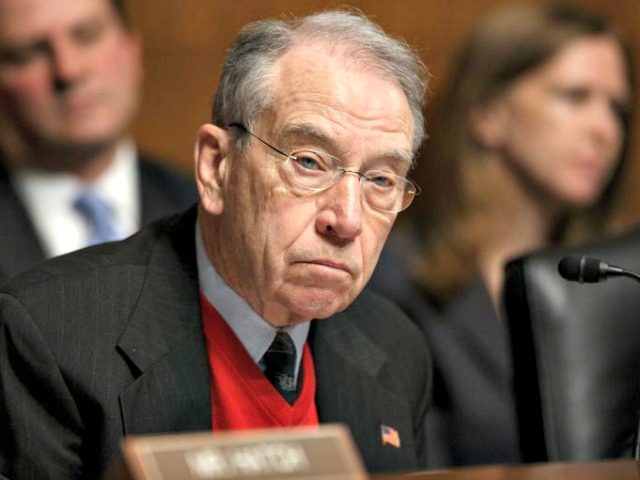WASHINGTON, DC – Senate Judiciary Committee Chairman Chuck Grassley (R-IA) announced Monday that he will not allow any senator to abuse the “blue slip courtesy” to block a judicial nomination. This paves the way for all of President Donald Trump’s nominees to get through Grassley’s committee for a confirmation vote by the full Senate, giving the president a major victory for the 2018 midterms.
Grassley’s office laid the foundation for Monday’s long-awaited and eagerly anticipated speech by distributing a policy memorandum on November 2 explaining the historical role of the blue slip, including that it is a courtesy that each Senate Judiciary Committee (SJC) chairman extends to his fellow senators as he sees fit, not any sort of Senate rule that is binding on chairmen.
“Blue slips have been around since 1917,” Grassley began. “I intend to honor the blue slip courtesy, but there have always been exceptions.”
Consistent with his policy memo, he explained that blue slips are “premised on the idea that home-state senators are in a good position to provide insights into a nominee from their state.”
“It’s meant to encourage consultation between the White House and home-state senators about judicial nominations,” Grassley added, and that each SJC “chairman has the authority to decide how to apply the courtesy” to facilitate such consultation.
But only two chairmen during the past century “required both senators to return positive blue slips before scheduling a hearing.” All the rest have not.
The first one to do so was 50 years ago, Sen. James Eastland. But Sen. Ted Kennedy changed that policy when he became chairman in 1979 because “he didn’t want a single senator to be able to unilaterally veto a judicial nominee.”
The standard used by Kennedy was likewise followed by the next three chairmen of the Judiciary Committee: Strom Thurmond, Joe Biden, and Orrin Hatch. All of them held hearings on judicial nominees who did not receive two positive blue slips.
In 1989, Chairman Biden sent a letter to President George H.W. Bush informing him that not getting back two positive blue slips “will be a significant factor to be weighed by the committee,” but “will not preclude consideration of that nominee unless the Administration has not consulted with both home state Senators.”
“I won’t allow the blue slip to be abused,” Grassley told the Senate Monday. “I won’t allow senators to block nominees for political or ideological reasons. This position is consistent with the historical role of the blue slip courtesy. It also matches my personal experience with the blue slip.”
Grassley gave the example during the 1990s of a nominee from his state of Iowa for the U.S. Court of Appeals for the Eighth Circuit. She was the former chairwoman of the Iowa Democratic Party and had served much of her career in elected office, where she had a history of making controversial political statements. For example, she condemned Christian conservatives, saying, “I hate to call them Christian,” and “I hate to call them religious, because they’re not, so I’ll call them the Radical Right.”
Nevertheless, when President Bill Clinton nominated her to be a federal appeals judge, Grassley returned his blue slip, despite her controversial partisan pedigree and his strong objections to such intemperate and inflammatory statements.
“A senator can’t use the blue slip to block a nominee because it’s not the person the senator would’ve picked,” Grassley explained. “The president gets to nominate judges.”
Grassley then drew the line he will require as SJC chairman:
The White House should consult home-state senators and it’s important that they do so in a meaningful way. But the White House may disagree with senators and may determine that a different individual is more suited to serve on the circuit court. So long as there is consultation, the president generally gets to make that call.
As long as President Trump’s team consults with both home-state senators for each nomination, Grassley indicated that he has been patient enough, and announced he will not allow any one senator to derail a judicial nomination merely by refusing to return a piece of blue paper to his office.
“I won’t let senators abuse the blue slip to block qualified nominees for political or ideological reasons,” Grassley declared.
Conservatives are certain to cheer Grassley’s declaration, for which they had been pushing since President Trump’s inauguration. Grassley’s decision eliminates all but one of the remaining roadblocks that have been slowing approval of President Trump’s judicial picks.
Judicial appointments have been one of President Trump’s most potent political issues, energizing the GOP base while also demonstrating to moderate voters the president’s effectiveness at producing results. Grassley’s decision clears the path for the president to rack up an impressive number of successful judicial appointments going into the 2018 midterm elections.
All of President Trump’s judicial nominees should now make it through SJC and end up on the Senate floor, where the task will fall to Senate Majority Leader Mitch McConnell to give them an up-or-down vote.
Ken Klukowski is senior legal editor for Breitbart News. Follow him on Twitter @kenklukowski.

COMMENTS
Please let us know if you're having issues with commenting.